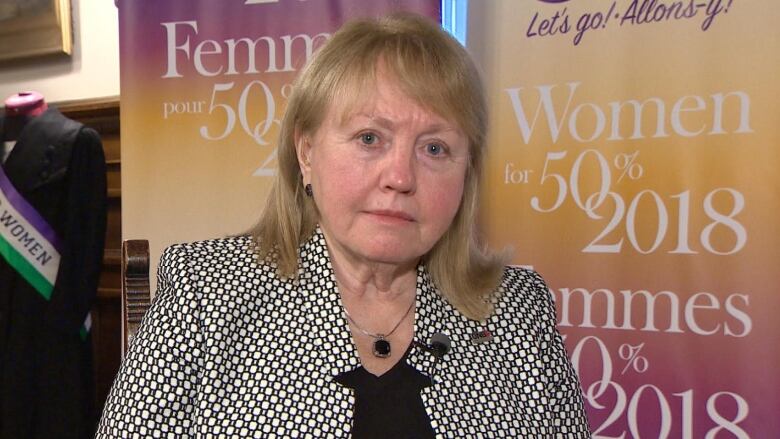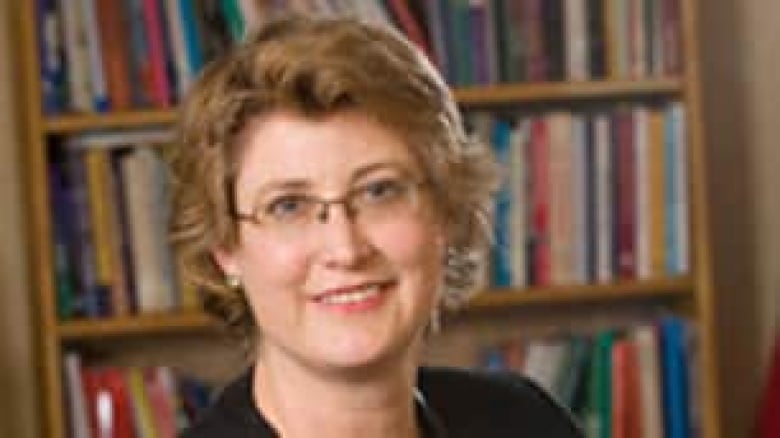Want more women in politics? Nominate them in 'winnable' ridings, expert says
A new group is trying to increase the number of female MLAs to 50 per cent in the next election

A new group's fight forgender parity in the provincial legislature is important but it's "probably unlikely" that it will achieve its goal by late 2018, according to apolitical analyst.
JoannaEveritt, a professor atthe University of New Brunswick, spoke to CBC News on Wednesdayfollowing the launch of Women for 50%,which is trying to increase the number of female MLAs to 50 per cent in the next election.
- Work begins now to elect more women to legislature in 2018
- New program aims to open political doors for young women
That would involve a more-than-30-per cent increase from their current numbers.
"I think that in order for 50 per cent to occur, there would need to be some significant structural changes in the way elections are conducted in Canada," said Everitt.
These are high-profile, well-connected and influential women, who are hopefully going to have their message heard.-JoannaEveritt
She said these changes could include replacing the province's existing electoral system with proportional representation, "which tends to be more conducive to the nomination of women and election of women," and reserving seats for women.
"These are changes I don't see us making in the next year in New Brunswick or even at the national level, which has also been discussing electoral reform," Everitt said.
"But I think there are things that can be done."
Nominating women in 'winnable' ridings
The evidence, she said, suggests that parties and their leaders can affect change by making "concerted efforts to broaden the backgrounds of the individuals that they nominate."
Recall, for example, when Stephane Dion, then leader of the federal Liberals, sought to nominate females as one-third of the party's candidates.

"The number of women candidates jumped, the number of women elected for the Liberals jumped," she said.
However, increasing their representation involves more than just nominating women.
"The challenge is getting those women elected," Everitt said.
"This is where New Brunswick has fallen behind so many other provinces."
Despite a recent incremental increasesin the number of female nominees, she said, these nominations typically take place in "swing" or "lost" ridings.
In 2014, Everitt pointed out, the Liberals didn't replace any of the party's resigning incumbents with a female candidate.

"So, while the party said, 'Yes, we're going to try to increase the number of women running,' they didn't nominate them in the ridings that the Liberals were the most likely to be winning in," she said.
Given this trend, New Brunswick has seen little change in recent decades in itsnumber of female MLAs.
Meanwhile, elsewhere in Canada, women are now better represented because their political parties have tried to nominatethem in "winnable" ridings.
"Parties have to be more attentive to this," Everitt said.
"They need to do more in terms of nominating women, but they also need to be doing more in terms of nominating women in those ridings where their party is most likely to be successful."
Group members poised for success
Ultimately, the professor says she's "extremely pleased" that Women for 50% has taken up this cause.
"I think that when I look at the women who are involved in this organization, the economic, business, academic and political experiences that they bring with them speak volumes to the potential for them to have success where other organizations haven't been successful," she said.
"These are high-profile, well-connected and influential women, who are hopefully going to have their message heard and going to be able to influence parties, political leaders and others within the broader New Brunswick community to think about this issue much more seriously than it's been done in the past."
With files from Rachel Cave












_(720p).jpg)


 OFFICIAL HD MUSIC VIDEO.jpg)
.jpg)



























































































